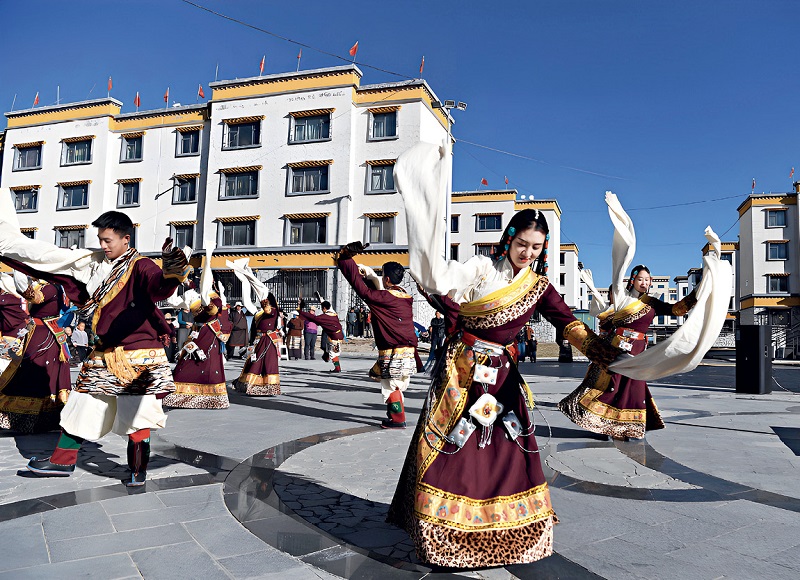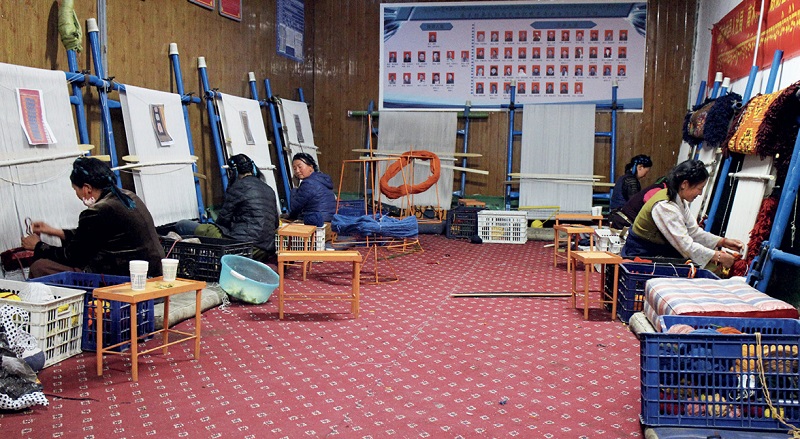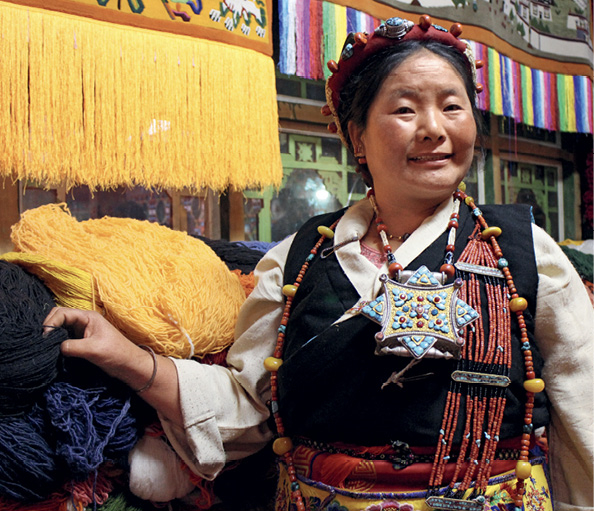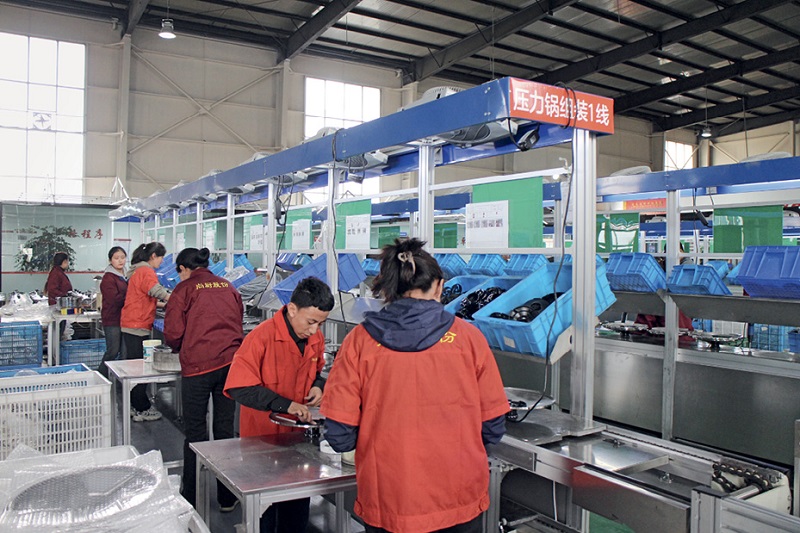With the help of governments at all levels, farmers and herdsmen in Tibet can now continually keep up with the progress of the times and social development through their own efforts.

An ethnic dance performed at the cultural square of the Naxingtang Community.
“Convenient facilities and relatively stable incomes are making our life increasingly promising,” enthused Yangjen Lhamo, who lives in Naxingtang Community, Nagqu City, Tibet Autonomous Region. She believes that her children’s life will be better.
The 47-year-old woman has eight children. Her eldest son has been working in her community after graduating from the Qamdo Vocational and Technical School, her eldest daughter works at a sweet tea house in the city, and the rest of the children study at middle schools or universities in Tibet and Gansu Province.

Twenty-five-year-old Chimed Dorje is a worker in the Naxingtang Community, Nagqu City, Tibet Autonomous Region.
Relocating for New Life
Naxingtang Community in Nagqu Town, Seni District, is a resettlement site for poverty alleviation and relocation. The community covers an area of more than 60,000 square meters and its 30 buildings house 2,003 relocated people. The relocation was completed in 2019, involving 12 towns in Seni District.
Before being relocated, Yangjen, from a rural area, rented a house in the city and worked to raise her children. Due to the early death of her husband, although eight children’s food, housing, and tuition are provided by schools for free, life was still difficult for the family. After the implementation of the relocation project, the Seni District government relocated 455 needy households to Naxingtang Community and provided 90-120 square meters of housing free of charge according to the size of each family.
After the relocation, her family continued to enjoy subsidies for rural residents from the government. “Our annual net income has increased from RMB 30,000 to RMB 70,000 now,” said her 25-year-old eldest son Chimed Dorje, who is looking forward to his younger siblings being admitted into universities and being able to find good jobs in Lhasa.
Recalling life in the village when he was a child, he described how rammed earth and stone houses were not very stable. Water, electricity, washing and sanitation, and Internet access were not as convenient as they are now, and there was no heating in winter. Now, as a fan of music, he often uploads songs he sings onto TikTok to share his life with others.
Talking about the employment and income sources of the relocated households, Tsering Chozom, the head of the Naxingtang Community, said that the community received funds from the district government, and implemented two supporting projects to achieve poverty alleviation, one is through industrial development and the other is a holiday resort. Through an employment demand survey, the community helped more than 50 people who had employment difficulties to land jobs in the holiday resort. At the same time, residents can also obtain income by selling their ethnic handicrafts.
Helping turn people’s lives around, the poverty alleviation relocation program has shown momentum and vitality. According to Tsering, the relocated farmers and herdsmen are living in new houses and enjoying a good life. With the help of local governments, they have been able to share the benefits of social, economic and technological progress.
“Relocation is the approach we are pursuing, and employment is the basic need we are satisfying in order to reach the goal of helping the people become financially stable,” said Zhou Qingke, head of the Publicity Department of the Nagqu Municipal Party Committee. “Developing the collective economy through poverty alleviation projects is one of the methods we utilize to help relocated farmers and herdsmen integrate into urban life.”
For a long time, Tibet’s road out of poverty had been hindered by the fact that the area was very vast with a sparse population and costs of poverty reduction were high. At the end of 2015, the poverty incidence in Tibet was 19.62 percentage points higher than that of the whole country, and the region as a whole was in a state of deep poverty.
“Ending poverty and never letting it be passed on from one generation to the next!” This has become the consensus of the more than three million people in Tibet. Government departments at all levels have adapted measures to local conditions, implemented policies in different categories, and adopted the most effective strategies and the most targetted methods to carry out relocation for the purpose of poverty alleviation. During the 13th Five-Year Plan period (2016-2020), there were 628,000 registered poor people in the region, of which 266,000, or 42 percent, were lifted out of poverty as a result of the relocation policy. Relocation has proved to be effective in reducing poverty and promoting sustainable development.

Locals are busy weaving at a farmers’ professional cooperative in Konglang Village, Dana Township, Xigaze.
Helping Rural Revitalization
Walking into a textile cooperative in Konglang Village, Dana Town, Xigaze, the sound of weaving could be heard coming from the workshop inside.
In the exhibition room, all kinds of Tibetan wool clothes and blankets made of traditional crafts are on display. Their exquisite workmanship and unique charm are very impressive.
Sonam, the 43-year-old head of the cooperative, is a skilled weaver and award winner at the first National Farmers’ Skills Competition, which was held in Liaocheng, Shandong Province in July, 2023. "I competed with more than 300 players selected from more than 3,000 registered participants across the country. It was an eye-opening experience for me. After a full day of competitions, my carefully woven cow-head ornament won third prize in the hand-knitting finals,” said Sonam.
Established in May 2019 with a total investment of RMB 2.3 million from 11 families, the cooperative currently has 25 employees. So far, Sonam has trained more than 130 women in five townships in the skill of weaving. After completing the training, each trainee is provided with a set of weaving equipment and tools by the cooperative free of charge. This helps locals find employment and increase their income through weaving contracting.
In 2023, the cooperative’s sales reached RMB 450,000 with a net profit of RMB 300,000. The cooperative takes out part of its annual profits to support the livelihood undertakings in the village, contributing to rural revitalization.
According to Tashi Tsering, Party secretary of Dana Township, it takes about 25 days to weave a set of Tibetan-style blankets based on the complexity of their patterns, and the cooperative pays RMB 6,000-8,500 for each set. At present, residents of Konglang Village produce about 180 sets of woven products for the cooperative annually, earning RMB 1.3 million or more.
Tenzin Chodron, a worker at the cooperative, has been learning the skill of carpet weaving for three years. “You can weave as long as you have time, and farmers can weave at night during busy farming season,” said Tenzin, who has an income of RMB 2,000-3,000 per month. She can also make money at home while taking care of her children.

Forty-three-year-old Sonam is a skilled weaver and award winner at the first National Farmers’ Skills Competition.
Located in the southeast of Namling County with an average altitude of 4,100 meters, Dana Township is home to 2,992 farmers and herders in four administrative villages. During the past few years, the township government has mobilized local entrepreneurs to establish cooperatives to promote employment and increase income for villagers. “Since 2019, our township has established 28 cooperatives in the fields of weaving, Tibetan furniture, aquaculture, bottled water, and machinery leasing,” Tashi said, “There are five weaving cooperatives in the township, and the annual income from weaving business reaches RMB 6.65 million, accounting for 12 percent of the township economy.”
An ancient skill has created an industry and improved the lives of local people. In recent years, the Namling County government of Xigaze has promoted local characteristic industries, given full play to the leading role of entrepreneurs like Sonam, and guided villagers in developing industries that exhibit local culture.
Different from the cooperative in Konglang Village, the cooperative for breeding, processing, and sales of livestock products in Qubu Village, Nagqu City, is more like a collectively-owned enterprise, and all the business activities of the villagers are carried out under the unified management of this enterprise.
Founded in 2010, the cooperative in Qubu Village is owned by every family, each of whom has invested in it with their livestock, pasture, and labor. At the beginning of its establishment, the per capita annual income of the villagers was only RMB 1,800, and the annual income of the village collective was RMB 46,000. Over the past 10 years, the cooperative has launched various types of industrial entities, such as fattening bases, livestock breeding, ethnic clothing processing, dairy production, and teahouses. As a result per capita annual income has risen to RMB 18,000 and the collective’s revenues exceeded RMB 5.35 million.
Karma Chonyi, who works as a cook in a teahouse run by the cooperative, enjoys his life very much. “I can earn salary with my cooking skills by working in the teahouse and get dividends from the cooperative at the end of the year. This has made my life much better than it was before,” he said. In 2022, Karma’s family received more than RMB 40,000 in cash dividends from the cooperative.
According to the cooperative director Tsewang Tashi, cooperatives play a leading role in improving rural lives, connecting local people with the market.
Specialized cooperatives have changed the mode of production and management of farmers and herders, and improved their production enthusiasm and efficiency. According to the Department of Agriculture and Rural Affairs of Tibet Autonomous Region, as of June 2023, there were 11,980 registered rural cooperatives in the region, including 138 national-level demonstration cooperatives and 118 autonomous region-level demonstration cooperatives. In 2022, about 1.2 million farmers and herders had joined cooperatives in the region.

An assembly line of Tibet Shangchu Cookware Technology Co., Ltd.
Small Things Matter
Tibet is located at a high altitude with low air pressure. Most pressure cookers sold on the market are designed for plain areas, making them unable to meet the cooking needs of the plateau people.
In February 2022, the regional government organized relevant professional institutions and six leading cookware enterprises to set up a technical research team to develop a pot suitable for the people living on the plateau.
After more than 20 technical discussions and research improvements, more than 30 kinds of plateau kitchenware products, such as multi-functional cookware, steamers, kettles, and outdoor products were launched. Tibet Shangchu Cookware Technology Co., Ltd. started operation in Lhasa Economic and Technological Development Zone on November 20, 2022, and has created an annual output of one million plateau special pressure cookware. Plateau cookware was put on the market in Lhasa on January 17, 2023, and was warmly welcomed by local people.
The autonomous region implemented a plan to support the promotion and application of plateau kitchenware products on March 25, 2023. To be specific, the autonomous region gives a subsidy of RMB 300 to each rural household and low-income urban household and RMB 200 to each urban household to purchase plateau cookware.
According to Cai Shuailong, general manager of Tibet Shangchu Cookware Technology Co., Ltd., the government subsidizes the purchase of 12L plateau pressure cooker. It purchases them from the company for RMB 400, and local people only need to spend RMB 100 to buy one at various rural promotional stores. Today, the sales of 12L pressure cookers has reached 350,000.
Dorje Yapei, a villager from Konglang Village who bought the pressure cooker a few months ago, said that pressure cookers he used in the past took a long time to heat up, boil, and decompress. This new pressure cooker has different settings for cooking different foods, making it easy to operate. The pressure is automatically released after pushing a button.
Choosing a suitable and durable cooker is a small family thing, but all the small things that make up people’s ordinary life are regarded by the government as major matters of people’s livelihood, which constitute the core of a people-centered development strategy.